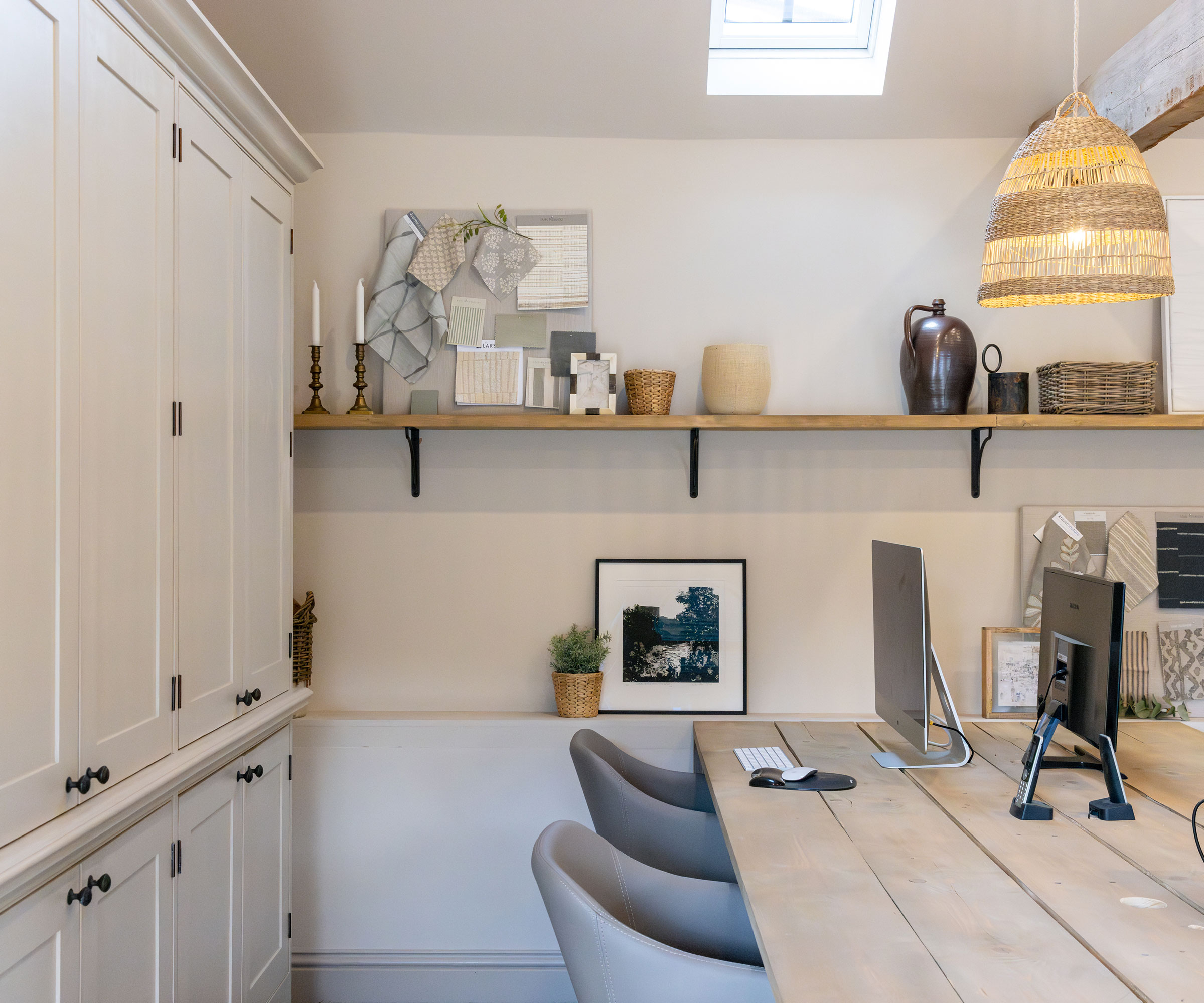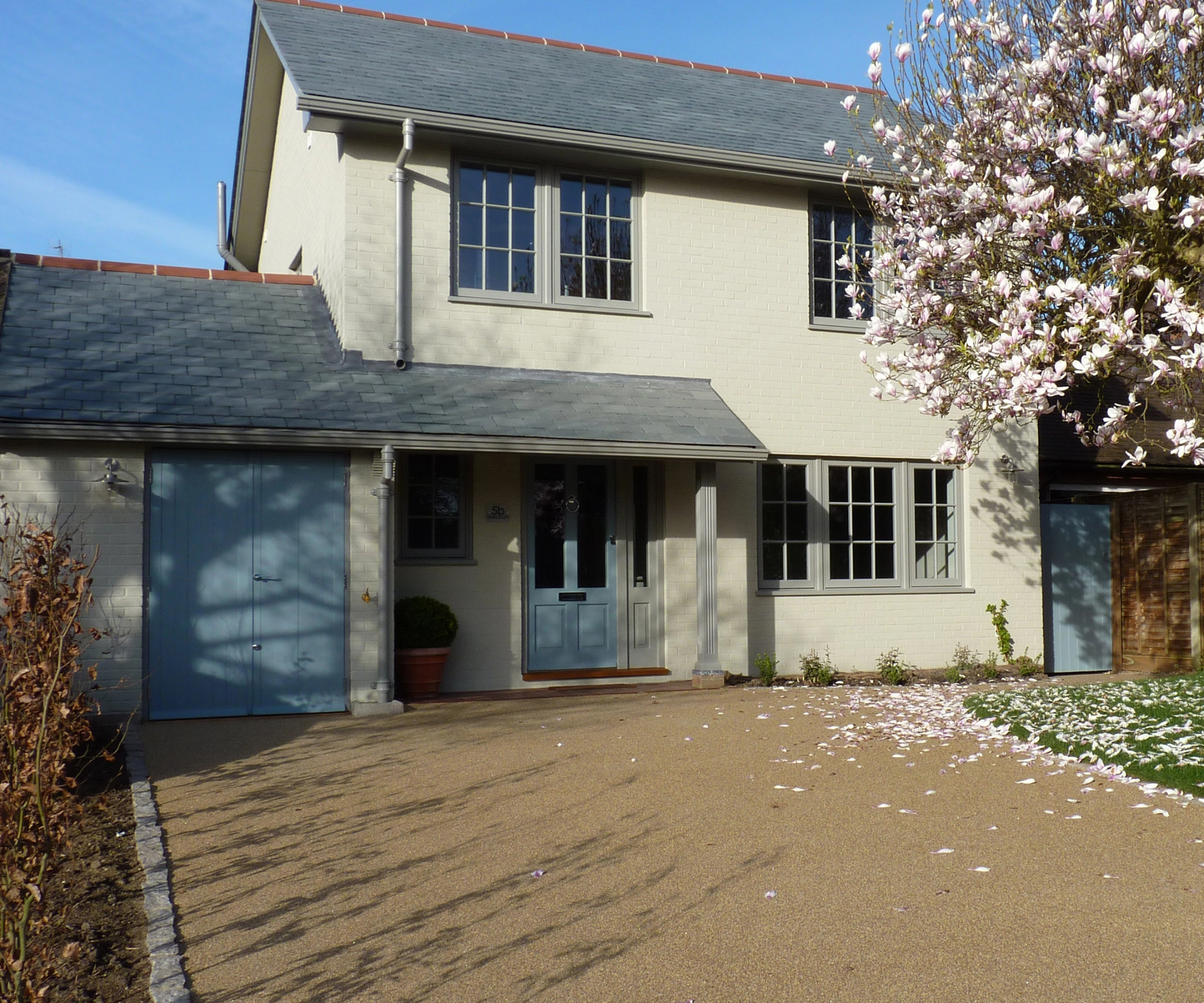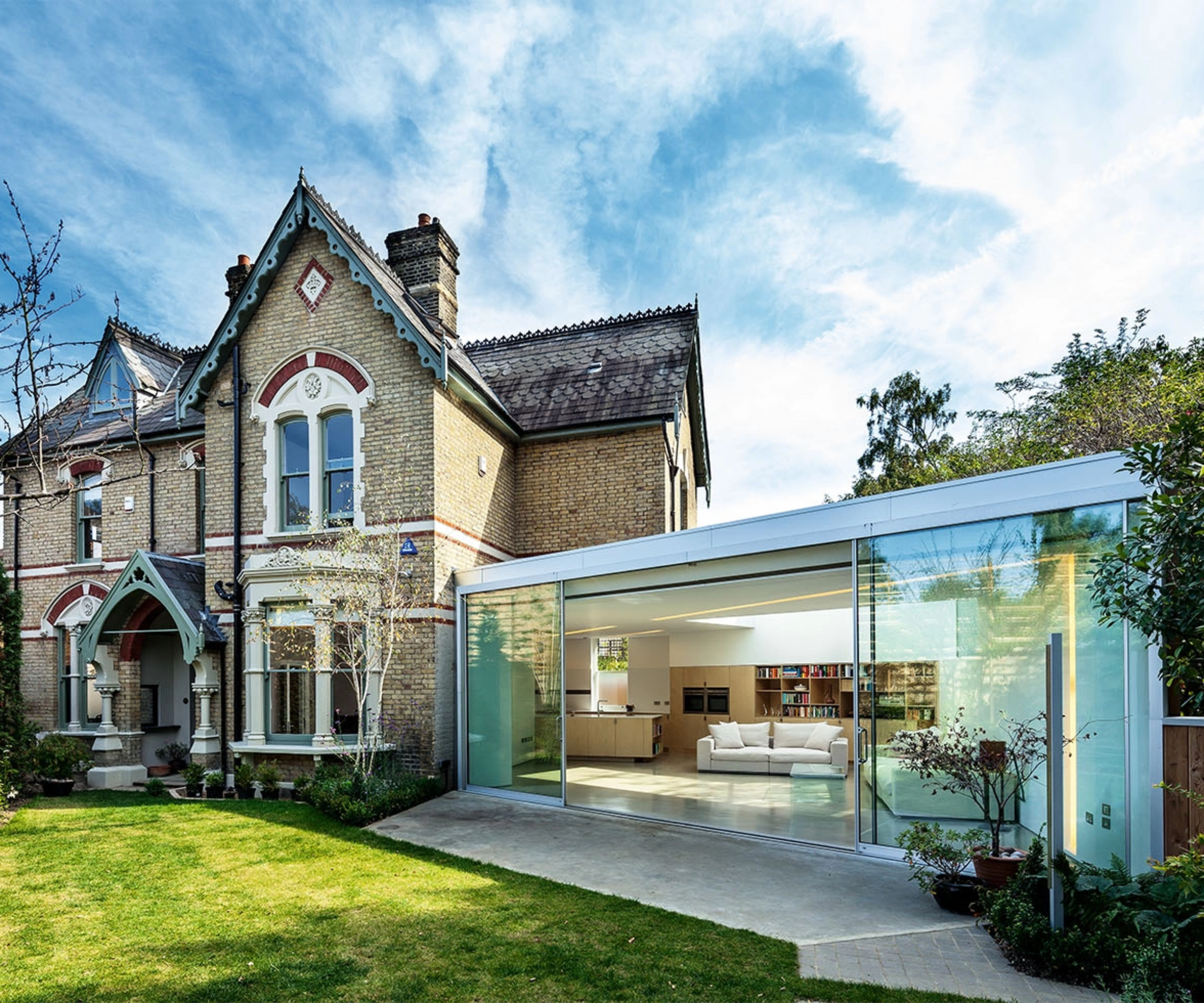Move or extend: How to make this key decision
If you're short on space or feeling restless, you may be weighing up the decision to move or extend. But what are the key factors to take into account when making your final choice?

Bring your dream home to life with expert advice, how to guides and design inspiration. Sign up for our newsletter and get two free tickets to a Homebuilding & Renovating Show near you.
You are now subscribed
Your newsletter sign-up was successful
As a self-confessed serial house mover – currently more than 20 times – I'm certainly no stranger to the lure of a new property. And while I've no short-term plans to move again, if I did, it would be to have more space.
But, with the uncertainty of a new Government, an on-going cost of living crisis and concerns regarding fluctuating interest rates, moving home can potentially come with a few risks right now. So, how do you decide between buying a new house or adding an extension? What are the practical questions you need to ask yourself and how will the housing market influence your decision?
We asked the experts for their answers to the question – move or extend: how to make this key decision – and here's what they had to say.
Move or extend – understand what is driving your desire for change
If location is your key driver, then there's not much point extending. As Kirsty and Phil rightly say, it's all about location, location, location. If you don't like the area where you live, the chances are you could spend thousands on renovating a house and you'd still be looking to move.
"Likewise, the decision to move is often driven by other factors such as a change of job, better schooling, or other social factors, which often outweigh the financial costs of moving," says David Hannah, group chairman of Cornerstone Tax. "Ultimately, where and how you live are personal choices, not driven primarily by financial concerns."
However, life circumstances aside, if your desire for a fresh start is because you need more space, don't like the exterior or interior of your home, the bills are too expensive, or you simply yearn for something more practical, then deciding whether to move or extend can be a little trickier to resolve.
Why? Because the reality is, moving or extending could provide a solution to any of the above scenarios. Even if you haven't got the home you want now, the right architect and build team could transform your current home into something new. Or, you may strike lucky and find the home of your dreams.
Bring your dream home to life with expert advice, how to guides and design inspiration. Sign up for our newsletter and get two free tickets to a Homebuilding & Renovating Show near you.
Experts suggest that with this in mind, the final decision should therefore come down to a combination of gut instinct, practical considerations and more serious matters involving economics, government legislation and market conditions.

David Hannah ACA CTA is Group Chairman for Cornerstone Tax, the UK’s leading stamp duty land tax advisory practice which deals in advising solicitors, accountants, financial professionals and clients on the correct calculation of stamp duty and the claiming of reliefs.
Housing prices
With recent news revealing house prices have shown their fastest annual growth for two years, understanding how the housing market may look is one of the first things to consider in your decision to move or extend.
In a market where house prices are rising, while it means you should get more if you sell, you'll also pay more for the house you want. The risk? House prices fall and you end up with a property worth less than you paid for it.
According to David Hannah, house prices are directly affected by three factors:
- The cost of mortgages and the cost of living generally
- The available supply of housing in any given area
- The economic opportunities available in that area
"Simply put, while affordability is always a concern, if an area is desirable to live in, it is likely that demand will exceed supply," says David. "Similarly, an economic upsurge in a particular area leads to an increase in demand for housing, which can force prices up, creating what are known as 'hot spots.'
"However, the tax implications of rising prices we believe, will remain unchanged from those currently affecting home buyers," he confirms, "as there is no prospect of any special reliefs for downsizers, relocators, or others driving a move to relocate."
And, while some experts suggest the improvement in prices will continue, others are a little more sceptical about what's ahead.

“2024 has proved to be a far more stable and positive year for the UK property market, with house prices stabilising, mortgage approvals returning to the previous market benchmark of 60,000 per month," says Marc von Grundherr, director of Benham and Reeves. "As a result, we’ve also seen transaction levels start to climb during the second half of the year."
"This positivity is expected to continue in 2025," he says, "and, with interest rates expected to fall further, current market momentum is forecast to grow even stronger. It’s forecast that buyer activity will improve with total mortgage approvals increasing by 2.8% in 2025 versus 2024, whilst transaction levels are set to climb by 10.2%. What’s more, this uplift will see the average house price grow by a further 2%."
However, David Hannah, is a little more cautious in his views.
"We expect that the housing market in 2025 will look much the same as it does in 2024. Functional and economic uncertainties surrounding interest rates, inflation, and affordability will persist until a sustained recovery in the economy is demonstrated," says David.
"Any increase in property prices will largely be due to an undersupply exacerbated by the excess demand already stored up in the economy."
What can you take from this? The fact that there is neither a boom nor bust currently predicted in the housing market in 2025 is good news if you are leaning more towards moving, as while you won't necessarily make a killing on your property when you sell, neither will you be paying over the odds for a new one.

Marc von Grundherr has decades of property market experience, and is not only an extremely knowledgeable and well established estate agent, but is also a property investor and buy-to-let landlord himself.
Government policies and planning reforms
When it comes to potential changes to the National Planning Policy Framework, despite various pledges, the Labour government's plans for homebuilding are still to be seen in action. This begs the question should you be waiting a little longer before deciding whether to move or extend in 2025 – or even put a hold on doing either?
“If you’re trying to decide whether now is the time to extend or more, it’s certainly worth sitting tight until the Autumn Statement," says Verona Frankish, CEO of Yopa.
"Whilst it’s looking unlikely," she says, "there may be some homebuyer initiatives included, such as previously implemented stamp duty relief and Help to Buy schemes. If such initiatives do get announced, it might make your choice that bit easier, as you’ll find you may be able to look at larger homes due to the cost saving on offer."
"Current government figures put total UK dwellings stock at around 3.4m homes in 2023 and this level of stock is forecast to climb by around 0.9% per year by 2025," notes Marc Von Grundherr. "This figure could increase further should Labour fulfil its ambitions to deliver 370,000 new homes per year.”
However, an enquiry into Labour's proposed use of grey belt land to meet this figure has already been actioned by the House of Lords, as well as the Local Government Authority urging government to reconsider the National Planning Policy Framework plans, suggesting it could be some time before this proposal becomes a reality.
And, are new build homes even in line with what you and a large percentage of the general public really want? A recent survey of 2,700 homeowners commissioned by The Campaign for Individual Homes, revealed there is a growing preference for self-build, smaller, community-focused developments rather than large-scale housing estates.
While moving may seem an easier option, whether the house of your dreams exists is another matter entirely, meaning sometimes extending, renovating or remodelling may be a far more bespoke and achievable solution.

Verona is the CEO of Yopa, an award-winning fixed fee estate agency which operates across the UK and recently launched an associates platform for self-employed agents.
Reforms and their impact on house extensions
So will any of Labour's potential reforms also affect you if you are leaning more towards the house extension route?
"Labour’s policies on new homes delivery have looked to encourage more building by easing planning restrictions," says Verona Frankish, "so you may also find that it’s easier to gain the permission required for the extension you would like."
However, there is a flip side to this relating to costs, labour and material shortages.
"It's also important to note that the housebuilding sector is already struggling to find adequate skilled tradespeople," says Vernonika, "and any drive to deliver more homes would only increase this demand.
"Therefore, if you’re looking to extend your own home, you may find it hard to find the right professionals to do the job, and those who are available are likely to cost more due to the supply and demand imbalance.”
"Other government policy changes that may have an impact on your decision include the current consultation on employment rights, particularly the right to demand home or flexible working," adds David Hannah.
"As such, your existing property might not be entirely practical for this right now, but could be extended to provide appropriate home working space, enabling you to enjoy both your home and your new work-from-home lifestyle into the future."
Adding a home office extension for example, could not only benefit you directly now, but also make your property more appealing to buyers in the future if the work from home drive continues to grow.

Cost considerations
With moving or extending both having cost implications, you'll also need to spend time crunching numbers to see which one has the greater impact – not just on your current budget, but also your potential return should you choose to move in the future.
Knowing how much does an extension cost is a crucial starting point and one which may change the course of your decision.
“Making changes to your home can be a great way to add value, especially if you’re looking to add more functional space instead of opting for a larger home," agrees founder and CEO of HaMuch.com, Tarquin Purdie.
"However, it’s not as simple as the value added," he cautions, "you also need to take into account the cost of implementing such projects."
With the rising cost of living impacting on the price of materials and labour, unless you are a skilled DIYer or home renovator, the chances are you'll find yourself paying more for labour and materials than you would have a few years ago.
"For example, whilst a bathroom upgrade is estimated to add £7,500 on average, it now costs an average of £5,000 to do – resulting in real added value of just £2,500," says Tarquin.
If you're looking at the best ways of adding value, "a garage conversion can be one of the most lucrative ways," he says, "bringing a boost of £14,000 on average even after the cost of the work is accounted for. Similarly a garden room office can bring an additional £13,000 on average.
"A full extension of around 20 square metres is thought to add £58,000 to the value of your home," he notes, "however, it’s important to note that the cost of an extension is one of the highest at £48,000, so it’s a lot of work to carry out for a possible ‘profit’ of £10,000.”
So while moving comes with its own cost implications, ranging from the uplift in paying for a larger property through to building surveys and mortgage costs, if you're able to secure a fixed rate mortgage for a sufficient period of time, you'll at least know your costs for the next few years.
Budgeting for an extension on the other hand may need to include a little more contingency to account for the rises in any labour and materials.


Tarquin is the CEO of HaMuch, a platform that helps you find the best quote from local tradesmen in your area. Having spent many years as a tradesperson himself, Tarquin knows all the tricks of the trade and just what is, and isn’t, worth seeking the help of a professional for when it comes to DIY.
Questions to ask yourself
Do you have a time limit for moving or extending?
“When deciding on whether to extend or sell, one key factor can be the timeline you’re working with," says Colby Short, co-founder and CEO of GetAgent.co.uk. For example, if there’s a baby on the way, you might have a certain date by which you need the additional space for a nursery.
"This can be tricky to work to but generally speaking, an extension and the time required to complete it can be a more predictable timeline to work to, providing your tradespeople are on point," he says.
"When it comes to moving home, the current time to sell sits at an average of 181 days from the day of first listing to completion. Of course, this could be far longer should you find yourself stuck in an overly complicated chain, or if your transaction collapses.”
Ask agents how quickly properties move in your area
To help make your decision, as well as arming yourself with the knowledge of how long an extension takes to build, ask agents how long houses are taking to sell in your area and of course, also take into the account that certain times of the year may not be the best for either scenario.
According to research from Zoopla, there are two key times to sell your home – from February to June and September to October. The winter and summer periods are historically slower, so if you want to move urgently, you need to think if this is even realistic. Or, do you need to accept it could take longer , as while it only takes one buyer to fall in love with your property, it may take six months for that buyer to find you.
Don't forget to factor in weather and planning applications if extending in 2025
With regards to extensions, you also need to think about the fact that winter is also problematic for building with poor weather conditions potentially impacting your house extension schedule.
Summer poses less problems on the weather front, but is also one of the most popular periods for home improvements, meaning you may find your preferred builder already booked up in advance. Add on top of this the length of time you may need to wait if you have to apply for planning permission, and suddenly weeks turn into months.
That said, unexpected delays aside, extending will generally offer a more controllable timeline than moving. I've sold within two weeks of being on the market and likewise taken over a year to find a buyer, followed by six months of waiting for the sale to finally go through.
Planning for every possible timeline for both moving or extending will all help you to build a more rounded view on whether to move or extend in 2025.

Colby is one of the co-founders of GetAgent.co.uk, a platform that utilises whole of market data to provide cutting edge data and statistics on estate agency performance, from the time it takes to sell in each area of the nation, to the percentage of asking price achieved.
Is my house suitable for extending?
Although you may love your current home and can imagine extending it or perhaps adding a loft conversion, if you have no previous experience of building, you'll need to establish if your house is in fact suitable for extending.
If you live in a populated area, one of the easiest ways to start is by taking a look at properties that are similar, or the same as yours. If they've added extensions or conversions, this will not only confirm it's likely you can do the same, but is also encouraging news when it comes to receiving planning permission or permitted development approval.
Owners of period properties, listed buildings, or those in designated areas such as conservation areas would be well advised to seek professional advice from a number of experts before deciding whether to move or extend. As a starting point, consider taking the following actions:
- Find a builder and ask him to take a look at your property and advise you what may or may not be feasible
- Have an initial chat with an architect to discuss your ideas and get some valuable creative input
- Talk to your local authority planning department to establish if any of these ideas are likely to be approved
- Liaise with your mortgage advisor or bank to see what options are available for funding
- Ask your local agents if there is much call in the area for houses of your style and if not, what there is a demand for

What is my long-term plan?
Although your immediate situation may be the driving force behind your decision to move or extend, it's important to also think longer term before making your final decision. If you only imagine living here for a few years, are you better biting the bullet and moving now? Or, will extending your home mean you can in fact stay longer and give you a potentially higher return when you do come to sell?
"We always tell clients, the key factors in deciding whether to move or extend are whether you love the location you're in, whether the property could be made to fit your needs in the medium term, and whether the property meets your long-term aspirations," says David Hannah.
"It's always worth looking to see if there is an alternative property that fits your needs and is currently available and affordable," he says. "If not, a decision to extend or reconfigure for the next, say, five years may well prove to be the optimal one, as it will allow you to preserve capital, build up further savings, and wait for that dream property to become available."
On a final note, it's also important to acknowledge the potential stress that's involved with moving or extending. While moving home is classed as one of the most stressful life experiences, living on site during a large extension project can be equally as challenging.
In fact a recent survey from Upstix showed that 46% of first time sellers (those homeowners moving out of their first home into a new one) found the experience to have impacted their mental health and wellbeing. And, while moving home, like most things, does become more manageable the more you do it, it nonetheless remains a major event involving time, planning and upheaval. Only you can assess if it works for you and your family, and in the same way you have to really think if you can cope with the mess, disruption and noise of building an extension.
Having done both and experienced the good, bad and the ugly of it all, for me, moving or extending – practicalities, costs and life circumstances aside – usually comes down to gut instinct and emotion. If you feel sad at the thought of selling your home, investigating the opportunities for extending are worth exploring. But if you feel no attachment and no desire to improve it, it's probably time to start looking for a new dream home. Or you could of course do neither and instead head to Plotfinder and enjoy the experience of building a house from scratch.

Sarah is Homebuilding & Renovating’s Assistant Editor and joined the team in 2024. An established homes and interiors writer, Sarah has renovated and extended a number of properties, including a listing building and renovation project that featured on Grand Designs. Although she said she would never buy a listed property again, she has recently purchased a Grade II listed apartment. As it had already been professionally renovated, she has instead set her sights on tackling some changes to improve the building’s energy efficiency, as well as adding some personal touches to the interior.
